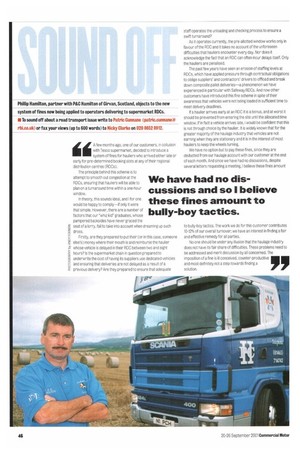d with i f t e h w T e m s o c n o t s h u s p a e g r o m , on e of f decided i customers,
Page 46

If you've noticed an error in this article please click here to report it so we can fix it.
toomi introduce din u collusion a system of fines for hauliers who arrived either lateor early for pre-determined booking slots at any of their regional distribution centres (RDCs).
The principle behind this scheme is to attempt to smooth out congestion at the RDCs. ensuring that hauliers will be able to plan on a turnaround time within a one-hour window. In theory, this sounds ideal, and I for one would be happy to comply—if only it were that simple. However, there are a number of factors that our "whiz kid" graduates, whose pampered backsides have never graced the seat of a lorry, fail to take into account when dreaming up such dross. Firstly, are they prepared to put their (or in this case, someone else's) money where their mouth is and reimburse the haulier whose vehicle is delayed in their RDC between two and eight hours? Is the supermarket chain in question prepared to underwrite the cost of having its suppliers use dedicated vehicles and ensuring that deliveries are not delayed as a result of a previous delivery? Are they prepared to ensure that adequate staff operates the unloading and checking process to ensure a swift turnaround? As it operates currently, the pre-allotted window works only in favour of the RDC and it takes no account of the unforeseen difficulties that hauliers encounter every day. Nor does it acknowledge the fact that an RDC can often incur delays itself. Only the hauliers are penalised.
The past few years have seen an erosion of staffing levels at RDCs, which have applied pressure through contractual obligations to oblige suppliers' and contractors' drivers to offload and break down composite pallet deliveries—a phenomenon we have experienced in particular with Safeway RDCs. And now other customers have introduced this fine scheme in spite of their awareness that vehicles were not being loaded in sufficient time to meet delivery deadlines.
If a haulier arrives early at an ADC it is a bonus, and at worst it should be prevented from entering the site until the allocated time window. If in fact a vehicle arrives late, I would be confident that this is not through choice by the haulier. It is widely known that for the greater majority of the haulage industry that vehicles are not earning when they are stationary and it is in the interest of most hauliers to keep the wheels turning. We have no option but to pay these fines, since they are deducted from our haulage account with our customer at the end of each month. And since we have had no discussions, despite several letters requesting a meeting, I believe these fines amount to bully-boy tactics. The work we do for this customer contributes 10-12% of our overall turnover; we have an interest in finding a fair and effective remedy for all parties.
No one should be under any illusion that the haulage industry does not have its fair share of difficulties. These problems need to be addressed and merit discussion by all concerned. The imposition of a fine is ill conceived, counter-productive and most definitely not a step towards finding a
solution.




































































































































